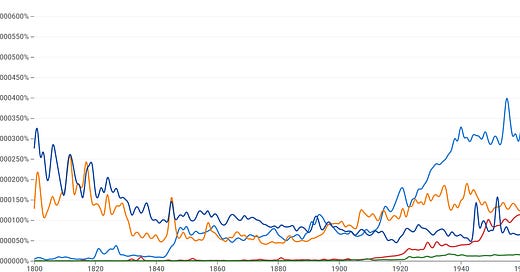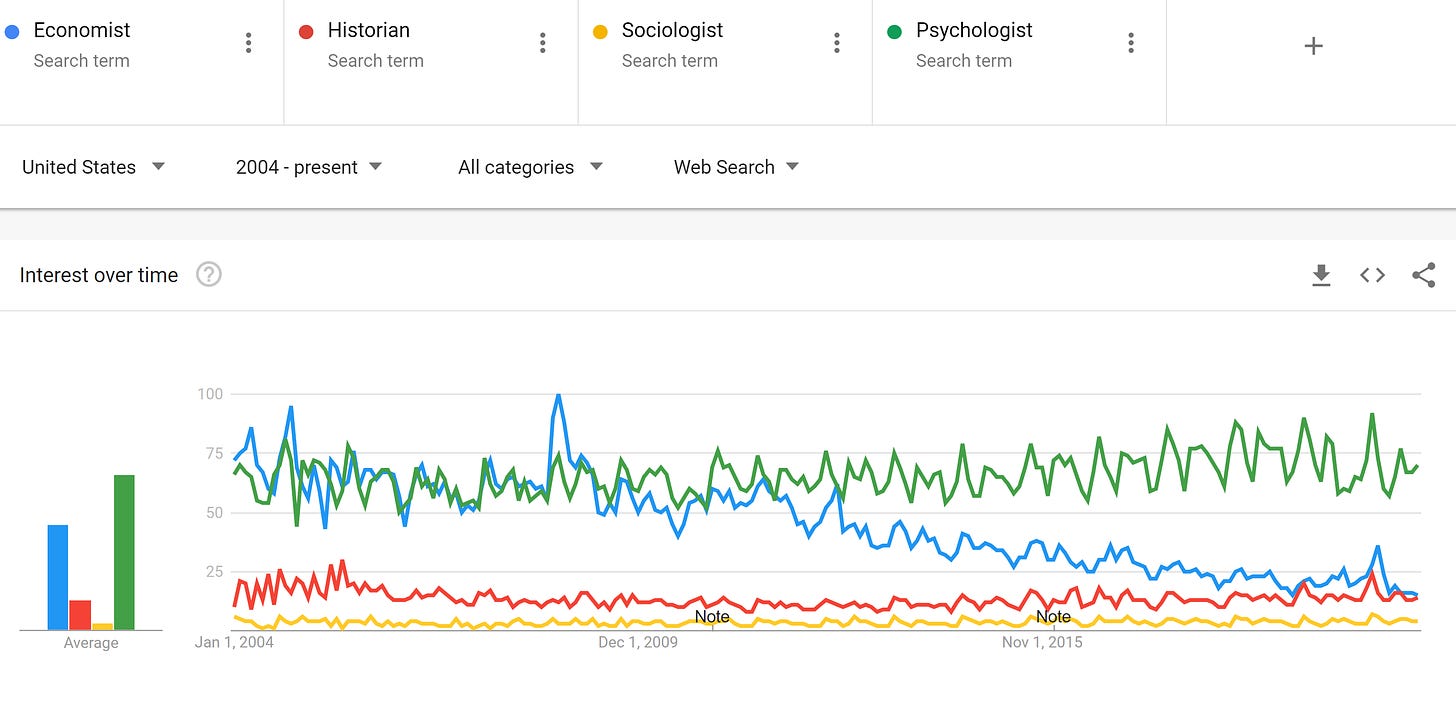
Discover more from Never Met a Science
I have been reading Robert Kline’s excellent history of the social foundations of cybernetics, impressed by the explicit effort taken by the organizers of the Macy Conferences (and Margaret Mead in particular) to bring social scientists up to speed on the paradigm and language that the applied-math / neurology side of cybernetics had been developing. This account is useful for anyone interested in developing new transdisciplinary academic institutions, but I was struck by the conspicuous absence of representatives of one of the social sciences in particular. The bullies, the bruisers, the spiciest of the bois: Economists.
I’ve got nothing against Economists — some of my best friends are economists! — but the story of postwar American social science is one of Economics imperialism. This is partly a story that might better be called “rational choice imperialism,” as SM Amadae compellingly argues in her 2017 article. Amadae’s analytical lens is the philosophy of science, and part of her thesis is that von Neumann/Morgenstern rational choice analysis had already been applied to many realms of human behavior before being fully integrated into mainstream Economics. Indeed, it may have been the prestige associated with game-theoretic research on nuclear deterrence that attracted more Economists to the method in the first place.
As readers of this blog will know, my preferred analytical lens is more the sociology of science, and in particular, the industrial organization of social science. So I will defend my assertation of the existence of Economics imperialism on these grounds. The discipline has disproportionate access to capital (human and non-human); in the contemporary “causal empiricist” paradigm (which Economists parochially call “applied micro”), they can study anything they want. The existence of this “frontier” increases the aggregate citations of Economists and enables them to produce admittedly excellent papers; the individual unit of Economics knowledge production is more rigorous than individual papers in other disciplines. This reifies the myth of Economist superiority while actively detracting from what I think should be the goal: improving the aggregate production of social science knowledge.
Ed Lazear’s famous 2000 article on “Economic Imperialism” defends the discipline’s prestige on philosophy of science grounds: they have tools (rational choice, general equilibrium, efficiency) that allow them to explain more of human behavior. The first sentence of the article is “By almost any market test, economics is the premier social science.”
Since 2000, however, our understanding of causality has come a long way; while Economics does have those tools and does enjoy a privileged status, the former did not necessarily cause the latter.
And most importantly, the prestige of Economics is on the decline, in both the long-term Google NGram (book corpus):
And in shorter term Google Trends (from search):
Their hegemonic position combined with decades of declining prestige has encouraged entrenchment and notoriously wasteful mathematical barriers to entry, at a variety of points (you need perfect math GRE scores and a math undergrad degree to get into top or even just solid PhD programs; you have to take a punitive methodology sequence regardless of subfield interest; peer review often entails arbitrary demands for extensive new proofs and can literally take decades).
This fundamental conservativism makes Economics less adaptable to new trends in social science practice, so much so that they have squandered their massive head start in quantitative rigor. The elevated status of the discipline gives them access to some admittedly top-tier talent (the average incoming Economics PhD student has had better quantitative training than in other social science disciplines), but in the aggregate, Economics’ methodological center of gravity is somewhat constrained. As someone who has been doing “Text as Data” since the second year of my PhD, it’s pretty amusing to see an “introduction to the use of text as an input to economic research” published in 2019.
But the economists continue to “feel their oats.” Although a few years behind innovations by Political Scientists and Sociologists in some cases, they still have elite quant methods training and the societal purview to study whatever they want. Helen Andrew’s account of Boomer Economist par excellence, Jeff Sachs, presents the Harvard Econ PhD as the closest thing our society (and perhaps, world) has to The Perfect Credential, endowing the holder with the keys to societal influence and prestige.
Not one to shy away from intellectual eclecticism, blogger and Harvard Econ PhD Tyler Cowen recently pointed to a tranche of NBER working papers that suggest that Economics imperialism is alive and well.
Mammograms and Mortality: How has the Evidence Evolved?
Representation is Not Sufficient for Selecting Gender Diversity
Back to School: The Effect of School Visits During COVID-19 on COVID-19 Transmission
The Public Health Effects of Legalizing Marijuana
Those are all new NBER working papers, issued today. To be clear, I do not intend this list as criticism, either of these papers or of the NBER (for one thing, I have not read them). But surely it is worth pointing out that something has changed. If you think economists should be doing these papers, does that translate into a relatively low opinion of the quantitative standards in those fields proper? Or maybe the economists are better at spotting interesting questions and seeing the work through? Yes or no? How exactly should we imagine the (possible) comparative advantage of economists with these topics? I mean these as genuine questions, not snarky ones. I have never been a per se opponent of economic imperialism.
I want to engage with this.
First…it’s not “spotting interesting questions”; millions of undergrads tasked with writing a policy paper have also decided that “The Public Health Effects of Legalizing Marijuana” is an interesting question.
Cowen’s premise (that this can be fruitfully considered from a normative perspective) reflects a selective application of the public choice framework with which he is generally familiar. Like imperialism imperialism, Economics imperialism is about power. Economists have successfully accumulated a disproportionate share of the quantitative-intellectual capital, but they are using it inefficiently, shredding that capital to consolidate the status of Economics while expanding the scope of its inquiry.
Broader efforts to reform social science practice cannot succeed without cracking open the sclerotic, insular discipline of Economics.
Economists, at the peak of the status hierarchy, are understandably uninterested in collaborating with or even acknowledging the work outside of their discipline. Angrist et al establish that Econ is getting more interdisciplinary, but is still nowhere close to Sociology or Political Science. (The disciplines of Anthropology and Psychology, each of which has grown towards topics in human biology, are hardly fair reference categories unless subset to specifically relevant journals/topic areas.)
To Cowen’s point above: the reason that Economists produce units of knowledge that take this form is the “industrial organization” of the discipline. The tyranny of the “Top Five” journals is far worse than in any other social science, so researchers in the subfield of “applied micro” (which encompasses all of the NBER papers above) are forced into allocating their energies into a small number of extremely empirically robust, hundreds-of-pages-long papers.
As I’ve written earlier, we are currently experiencing an analogue of Economics imperialism: empowered by a windfall of data, Computer Scientists have set about to studying everything under the sun (or rather, everything not under the sun…because it is actually inside of a house, on a computer). It is the combination of computational skills with the conference proceedings model (a rapid-review, marginal-increment, atheoretical form of knowledge production) that enables the contemporary Computer Science imperialism.
So while the quantitative skills of the Economists who are newly emboldened by the manifest destiny of applied micro are undeniable, the sociology of Economics knowledge production makes the scattershot approach untenable. Indeed, we might think of the entire enterprise as a form of “site-selection bias”: ambitious young Economists can study the entire world and thus select the research questions that are amenable to their quantitative methods.
The number of Economist-hours is a constraint on knowledge production; the knowledge-shredding technology of top paper publication restricts the scale of this production further. Economists cannot develop entire literatures in mass shootings and mammograms, and the other disciplines lack the quantitative skill (and the prestige, the source of standing within the sociology of academia) to push back against or refine their findings.
The current landscape sees Economists lobbing impeccably crafted papers into any conceivable area of social science inquiry. The reason this is happening, the public choice scholar understands, has nothing to do with the nominal goal of doing science well, and everything to do with individual incentives for career advancement and prestige.
These papers are inevitably well-cited. The ubiquity of services like Google Scholar reify a metric which weights all citations equally—replacing a less precise but more accurate tacit knowledge of paper influence. Given a finite number of cites from within Economics, the motor of Economics imperialism is the existence of other disciplines with untapped citation potential.
Further, the existence of this “frontier” serves as a pressure valve: young Economists are able to amass reputational capital while avoiding existing conflict in the discipline. They may occasionally annoy scholars already working on these topics, but hey, epidemiologists are not about to publish in the AER so who cares. And unlike, say, a new empirical paper on the effect of minimum wage laws, no other Economist is likely to study the same topic, rendering the paper beyond relevant scrutiny.
What should we do about it? This is just an article on the internet, so the goal is of course to lower the status of Economists jumping into other disciplinary spheres.
A more direct challenge, to practicing Economists, stems from my frequent pre-occupation with external validity, temporal validity and knowledge synthesis. A single research paper is useless; the dimensions of variability are unknowable ex ante but must instead be discovered through replication (both direct and conceptual).
But don’t take my word for it! Here’s a gen-yoo-eyne, certified Economist! Each of the results is just one point on this graph (or perhaps less than a point, since this graph is all RCTs) — which is to say that we cannot be sure that the sign of the effects described in a given paper is correct. The culture I’m criticizing is, in effect, redistributing Economics production so that there is a single point for each research question and thousands of research questions instead of twenty. That is, we will never be able to make this graph with a row with dots representing each of the causally well-identified school shootings.
The reason I’m a practicing social scientist is that I believe that the system is self-correcting in a way that most systems are not. So I’d like to hear Economists defend the current model; why do you think this is going to work? Is there an affirmative case for it?
Subscribe to Never Met a Science
Political Communication, Social Science Methodology, and how the internet intersects each






